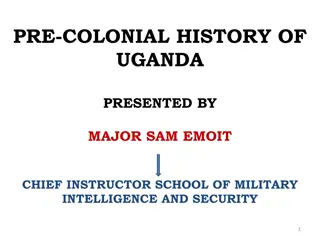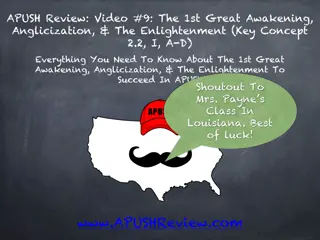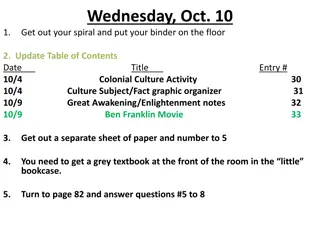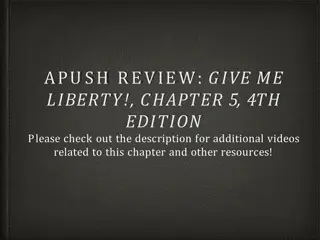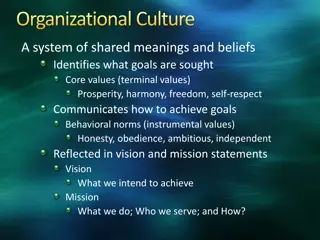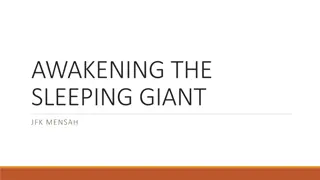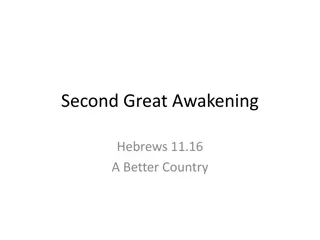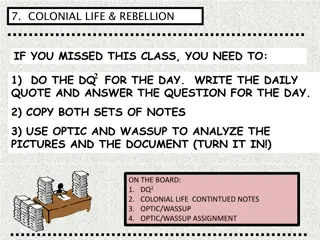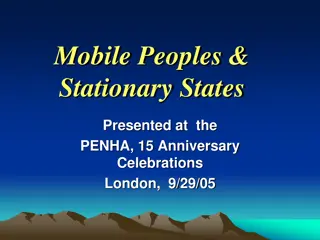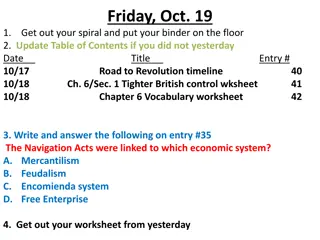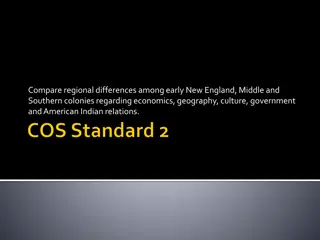Colonial Culture and The Great Awakening: Overview and Impact
This content covers activities and notes related to Colonial Culture, Native Americans, Colonists, and the African American community. It also delves into the Great Awakening and Enlightenment period, discussing the religious movement in the 1730s-1740s. Traveling ministers, such as Jonathan Edwards, preached about the importance of inner religious emotion. The content emphasizes the changes in colonial culture, the establishment of new denominations, salvation for all, and the founding of colleges to train ministers.
Download Presentation

Please find below an Image/Link to download the presentation.
The content on the website is provided AS IS for your information and personal use only. It may not be sold, licensed, or shared on other websites without obtaining consent from the author. Download presentation by click this link. If you encounter any issues during the download, it is possible that the publisher has removed the file from their server.
E N D
Presentation Transcript
Wednesday, Oct. 3 1. Get out your spiral and put your binder on the floor 2. Update your Table of Contents Date 10/1 Colonial Culture Activity worksheet 10/1 Native American/Colonist/African Am. Fact graph 10/3 Great Awakening/Enlightenment notes Title Entry # 30 31 32 3. Turn to entry #32 and set up Cornell notes http://www.youtube.com/watch?v=pk290guzDfg 4. Extra Credit tonight: Watch the presidential debate and write a one page response including the who, where, what, how (they carried themselves, reacted, etc.) Who do you think won and why?
7thLR Thursday, Oct. 4 Name Roanoke Writing T of C Notes #7, 9, 13, 15 Pilgrim Poem Mayflower Compact Thomas x Zach x
Great Awakening/Enlightenment V. The Great Awakening (Religion) *1730 s-1740 s religious movement
V. The Great Awakening *1730 s-1740 s religious movement (Religion) *Traveling ministers preached that inner religious emotion was more important than outward religious behavior
V. The Great Awakening *1730 s-1740 s religious movement (Religion) *Traveling ministers preached that inner religious emotion was more important than outward religious behavior *Jonathan Edwards preached God s anger but everyone could be saved http://www.youtube.com/watch?v=4vUYUyZFINE&feature=related
V. The Great Awakening *1730 s-1740 s religious movement (Religion) *Traveling ministers preached that inner religious emotion was more important than outward religious behavior *Jonathan Edwards preached God s anger but everyone could be saved *Changed colonial culture 1. New denominations
V. The Great Awakening *1730 s-1740 s religious movement (Religion) *Traveling ministers preached that inner religious emotion was more important than outward religious behavior *Jonathan Edwards preached God s anger but everyone could be saved *Changed colonial culture 1. New denominations 2. Salvation for all
I. The Great Awakening (Religion) *1730 s-1740 s religious movement *Traveling ministers preached that inner religious emotion was more important than outward religious behavior *Jonathan Edwards preached God s anger but everyone could be saved *Changed colonial culture 1. New denominations 2. Salvation for all 3. Founded colleges to train ministers
V. The Great Awakening VI. The Enlightenment * Reason and science were the paths to knowledge
V. The Great Awakening VI. The Enlightenment * Reason and science were the paths to knowledge 1. Isaac Newton laws of gravity Summary
V. The Great Awakening VI. The Enlightenment * Reason and science were the paths to knowledge 1. Isaac Newton laws of gravity 2. John Locke people have the right to life, liberty, property (people create governments to protect these) Summary
II. The Enlightenment * Reason and science were the paths to knowledge 1. Isaac Newton laws of gravity 2. John Locke people have the right to life, liberty, property (people create governments to protect these) 3. Ben Franklin electricity http://www.biography.com/people/benjamin-franklin-9301234/videos/benjamin-franklin-full- episode-2073416372 Write 4 questions Summary
Ben Franklin Use pages 95 to 112 to fill in the chart Childhood/Family Jobs Inventions Politics Other Interesting Facts Random Facts






